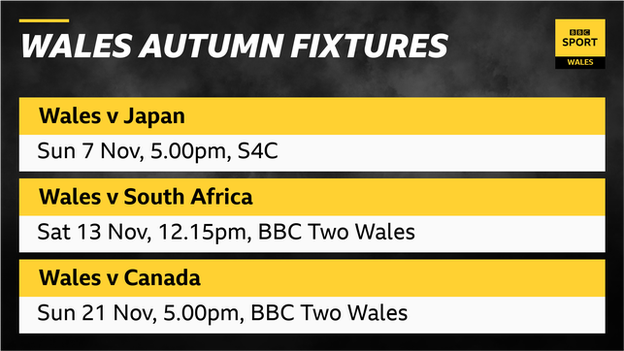WRU to offer first professional 15-a-side contracts to women
- Published
Player 'bravery' helped Wales contracts arrive - Siwan Lillicrap
The Welsh Rugby Union (WRU) is set to offer some of its female internationals their first professional contracts.
Up to 10 of their 15-a-side players will be awarded full-time deals, while there will be retainer contracts for 15 more individuals.
The 12-month contracts are currently being drawn up - with their value currently undisclosed - and are set to be in place from 1 January, 2022.
There will also be match and training fees for the women.
The announcement comes after the WRU's new performance director Nigel Walker admitted the governing body had not "covered itself in glory" in how it managed the women's game in the past.
There have long been calls for the WRU to do more to support the women's game and calls to introduce contracts were strengthened when Wales' global rugby sevens star Jasmine Joyce tweeted she would have to return to work in December when her funding runs out.
Allow X content?
This article contains content provided by X. We ask for your permission before anything is loaded, as they may be using cookies and other technologies. You may want to read X’s cookie policy, external and privacy policy, external before accepting. To view this content choose ‘accept and continue’.
The contract announcement sees the WRU follow in the footsteps of the Rugby Football Union in England, which awarded some of its 15-a-side female players first professional deals in 2016.
Five years on, the Red Roses have 28 contracted players and are ranked number one in the world. They backed up that title with a 43-12 demolition of New Zealand at Sandy Park on Sunday.
Elsewhere, France are semi-professional, 10 Scotland players have contracts, Ireland get per diems - a set amount of money every day when they play - while Italy get their expenses paid for.
The contracts in Wales will be offered to the players who the coaches believe have the most potential ahead of next year's Rugby World Cup in New Zealand.
Walker said: "We are committed to making the women's programme one of the best in the world and this announcement is a first, but major step in the right direction.
"Performance environments are much more than just what people get paid, but we're putting together a performance environment and an opportunity for our women to be the best version of themselves, to operate as a team and to be competitive.
"The players have had a key role to play in this process to date and we feel this is the best way to make real gains on the world stage in the short and longer term.
"I am confident we will be a better team six months from now than we are, 12 months from now and then beyond the World Cup I would expect us to grow as a team and to become more and more successful and consistent.
"Siwan [Wales captain Lillicrap] and some of her colleagues will take the decision to become full time because they [the contracts] are generous enough for them to become full time.
"There are two sums of money available, the individual then has a decision to make: Do I want to become a full time professional rugby player? Do I want to be a semi-pro rugby player? Or am I going to reject those and continue to play for fun, and if I get into the Wales team I get into the Wales team?"

Wales' coaching team L-R: Sophie Spence, Richard Whiffin, Ioan Cunningham and Geraint Lewis
Wales are currently on a two-year losing streak, but head coach Ioan Cunningham believes the contracts will make a "huge difference" to how competitive they can be at the World Cup.
"We will be able to go from catching up with players at weekend training camps and one midweek session to training up to four times a week. We will be able to develop individual performance plans for the players to manage and maximise their potential," he said.
Lillicrap added: "It will allow some of our players to commit to being professional athletes and also take charge of certain tasks on behalf of the team, for example around analysis, and others to make decisions around their personal circumstances that will allow them to train and recover in a more manageable way."
Walker also addressed the lack of performance pathways for women in Wales.
In April this year, 123 former Wales players wrote a scathing joint letter to WRU chief executive Steve Phillips pointing out the inequalities in game.
"Your systematic dismantling of the age-grade and development pathways contributes significantly to the failures of the women's game in Wales today," it said.
It resulted in a 4,000 signature petition to bring back Wales' female age-grade and regional teams.
"We are working hard behind the scenes on steps to make sure we have a robust player pathway to underpin the top level," said Walker.
"We are in the process of recruiting a head of age grade (male and female) along with coaches to run U18 and U20 sides for both the male and female game, and establishing the best competition structure to develop those players."


DEAR MRS CAMPBELL: A letter of celebration to Wales' first black headteacher
THE CASABLANCA: How a Cardiff nightclub changed our lives
